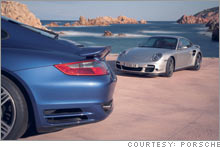Porsche: Still great where it countsLove it or hate it, the Cayenne SUV has allowed Porsche to keep its sports cars pure.NEW YORK (CNNMoney.com) -- Decades later, the view from the cramped, rock-hard back seat of my father's Porsche is imprinted clearly in my mind. I remember the sound of the air-cooled engine just behind me and the smell of his hair oil. I can see the twisted fingers and bulging knuckles of his right hand, sticking out from his string-backed driving glove, as he works the shift lever, (his hands were mangled in a crash at Watkins Glen the year I was born.)
A decade after my father passed away, Porsche strayed from the crystalline brand purity it had in my childhood. Back then, Porsche meant sports cars. Some great. A few arguably unworthy. But at least you knew what they stood for. But in 2003 Porsche began selling SUVs. Had my father been alive, and had I wished to kill him, I would only have had to show him a Cayenne. And, in about three years, Porsche will be selling a four-door sedan, something only slightly less unthinkable. So far, predictions that the Porsche brand image would become sullied, that the bloated Cayenne SUV would suck the value from the Porsche crest, have proved unfounded. Sales of the Cayenne have softened along with the general SUV market. They now sell at transaction prices about $2,250 off sticker price and in numbers half what they did in the early months, according to data from Edmunds.com, CNN's partner for automotive data and content. (Even so, the Cayenne is still Porsche's best-selling model, but only by a bit.) Meanwhile, Porsche 911s, with base prices ranging from $73,000 to up to $123,000, still sell at full sticker price. Lower-priced cars, like the Boxster convertible and Cayman coupe, are also selling at close to sticker price, according to Edmunds. You could argue that the Cayenne, far from destroying Porsche as a sports car company, allowed Porsche to concentrate on keeping its sports cars as true to the ideal as possible. At the very worst, the Cayenne has done Porsche no harm. Charlie Hughes, former head of Mazda in the U.S. and author of the brand management book "Branding Iron," sees the Cayenne as a bloated, ungainly product that strays from every element of what the Porsche brand stands for. I'd give the Cayenne a bit more credit than Hughes does, but his view of the Porsche SUV is far from unique. Porsche argues that it had to produce an SUV to survive as an independent company. Hughes, who also worked as a marketing executive for Porsche for a time, argues that it's an overstatement. But Porsche at least took a risk where it was safest to take it, away from the delicate heart of its brand. Heritage trust "They continued to develop the 911s, Caymans and Boxsters," said Hughes. "This is not a case where they took their eye off the ball" The first Porsche was a rear-engined sports car. The 911 and its predecessors were rear-engined cars. Porsche has made several front engined models but, today, all of Porsche's sports cars have the 911-style lay-out. The flat six-cylinder engines mounted aft of the seats keep the cars' center of balance tightly focused just behind the driver's back. The Cayman, Porsche's most recent introduction, is a superb example of why the Porsche brand remains strong. It feels and drives like a Porsche. There's more engine noise than in a 911 and the cabin isn't quite as open and comfortable, but the it has the same driving feel, the same sense of balance and security in tight turns, as a 911. The upper end of the range is anchored by the 911 Turbo. Again, it has a flat six-cylinder engine mounted behind the driver. But this time, it's turbocharged, producing a remarkable 480 horsepower. In the 911 Turbo, Porsche adds all-wheel-drive for traction that makes the car feel as if it's epoxied to the asphalt as it thunders through turns. Besides Porsche's engineering finesse, the basic shape of these cars adds to the sense of intimacy with the road. The largely empty front end ducks out of view leaving nothing but the asphalt ahead, seeming to rush right underneath you, framed by a bit of the right headlight bulge. There are some really excellent and genuinely competitive cars out there at lower prices but Porsche offers a unique experience. If you want to get it, you have to buy a Porsche. Whatever they decide it costs is what you have to pay. And, unfortunately for those who want in, the prices can be steep. (And watch out for those options.) Next stretch Now, perhaps emboldened by the success - at least for a time - of the Cayenne, Porsche will be producing a four-door sedan, the Panamera, due to be introduced in 2009. Could this be the stretch that finally snaps the brand? Design will be key, Hughes thinks. "It's got to look the part," said Hughes, "which I don't think the Cayenne did." Also, he said, the car has be light and it must handle superbly. Again, in keeping with core Porsche philosophies. But the key factor will be Porsche's ability to keep its eye on the foundation of the brand, its sports cars. So far, that part has never looked better. Porsche can take the occassional side trip, if it wants, but it had better keep its eyes on the main road. ________________________ Is your profession one that customarily receives holiday tips? Do you have an interesting tipping story or experience? Tell us about it. You could be featured in a future story. |
| |||||||||||||||||||||||

